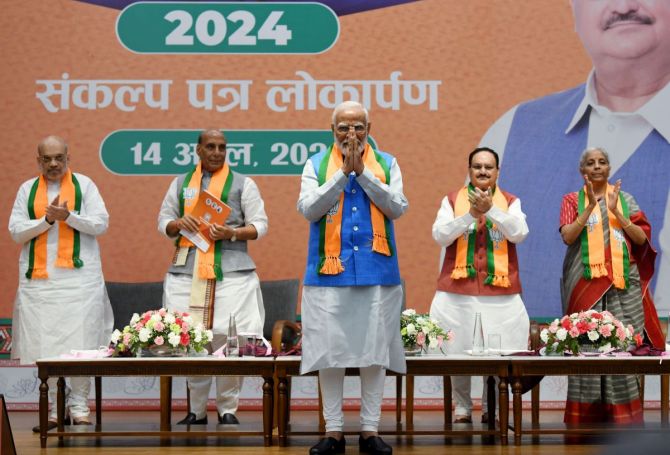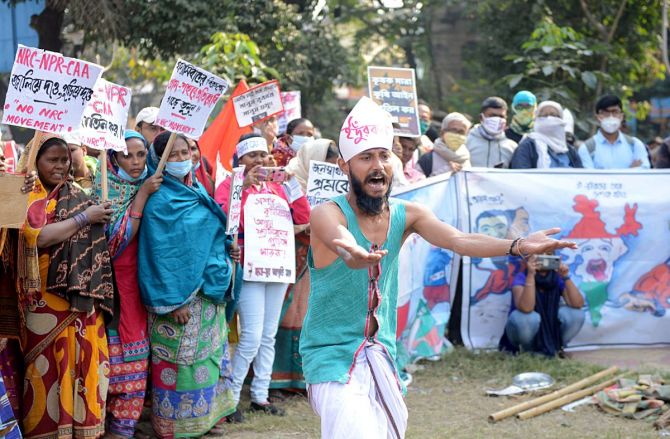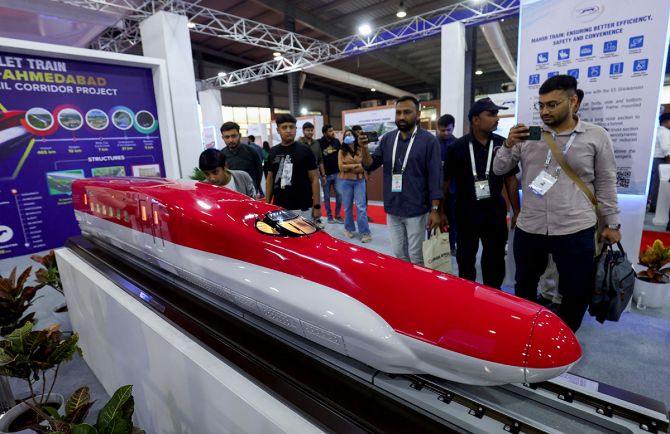To understand Modi, listen to what he does not say, suggests Prem Panicker.

You can read the post that follows. Or you can just listen to the song embedded (external link) -- as comprehensive, and damning, an indictment of Modi and his regime as a thousand editorials.
Few voters bother to read a party's election manifesto -- what little is known of the contents comes from the post-release back and forth between the party and its opponents, and the spin the media choses to give each party's promises.
And for the BJP, that is a good thing -- that people will not read. If they did, what would they make of a manifesto whose promises include lines like this:
Seriously? You might as well have released a one-line manifesto that read: 'We will undo the damage we caused over the last five years.'
But I'm getting ahead of my story. The BJP on Sunday released its manifesto, almost like it was ticking one of those irritating but necessary boxes before getting back to the business of gaslighting.
It was only on March 30 that the party got down to forming a committee -- headed by Rajnath Singh, with both Narendra Modi and Amit Shah absent -- to put the document together. The resulting manifesto, released with just five days to go for the first round of polling, is an extraordinary example of the party's belief that it can get away with just about anything.
It begins with a recap of what it calls '10 years of good governance', and every other line is jaw-dropping. My personal favourite is this one, from the section Surakshit Bharat:
The Press Information Bureau of the Government of India had, on 31 December 2018, released a list (external link) of terrorist incidents from 2018 till that date.
The screenshot below relates only to Jammu and Kashmir; the list contains even more:

According to the government itself, there were 1,708 terrorist incidents in just the first five years of the Modi regime, accounting for 138 civilian casualties and 339 security personnel killed in action.
Remember that the cut-off date for the government's press release is the last day of December 2018. Since then, and only counting J&K, there was a 12 June 2019 attack in Awantipora where 5 security personnel were killed. Then there is the Pir Panjal region, where terrorist attacks began on 1 January 2023 and have continued unabated since -- attacks that have, as this report (external link) points out, resulted in the killing of 52 people in Poonch and Rajouri alone, while the other 20 districts of J&K accounted for another 82 deaths.
The BJP could have just skipped any and all references to terrorism, but no -- they chose the Big Lie (external link).
The point is this: A party that even today talks up the dushman ke ghar mein ghuskar maara trope simultaneously claims that the dushman never did anything to merit retaliation.
While on the ghar mein ghuskar... line the government and its chicken-hawk loud-hailers trot out with irritating regularity, remember The Guardian story (external link) suggesting that India ordered targeted assassinations in Pakistan?
By way of making lemonade out of the Guardian's lemon, Modi has revived the ghuskar maara line on the stump. At a 11 April rally in Rishikesh, for instance, the PM said:
If you boast in public that you are carrying out cross-border killings, it weakens your own case that the plot to kill Khalistani separatist Gurpatwant Singh Pannun in New York was the work of 'rogue elements' without the official sanction of the Indian government.
Despite the government's best efforts, Washington has shown no inclination to drop the subject -- as recently as 31 March, US Ambassador Eric Garcetti said that attempting to assassinate the citizen of another country was 'just an unacceptable red line'. And here is the PM, no less, admitting -- boasting -- that India has crossed that line.
The mysteriously missing NRC

On social media and in some sections of the press, I noticed muted triumphalism in regarding the dropping of any mention of the NRC from the BJP manifesto.
Aakar Patel, that most clear-eyed of commentators, posted on Twitter (external link) that those assuming the Shaheen Bagh protests haven't had an impact should take note of the axing of the NRC project. He is not the only one to take that line.
I don't know so much. My attention was drawn to what the manifesto does say -- and it clearly says that the CAA stands, and that it will, emphasis mine, 'give citizenship to all eligible persons'.
That leaves a key question unanswered: How will the government determine eligibility? The NRC, of course.
What the BJP has done is merely hidden its intent, not given up on it. It knows that it is already fighting for its future (ignore char sau paar for the narrative-setting it clearly is; the party itself knows that it is not getting anywhere close), and any overt mention of NRC will be a red flag that will ignite a fresh wave of protests just when the BJP can least afford it.
To assume that the BJP dropping any mention of the NRC from its manifesto is a sign of capitulation is to ignore everything we have learned about the party, from the evidence of its own actions, over the past ten years.
From around the country, reports speak of how people are demanding accountability; how they are asking BJP candidates to account for the promises made by the party five years ago.
So this time, Piyush Goyal and other BJP worthies have taken to the airwaves to point out that this latest manifesto is not for the next five years but for the next 25 -- as neat a way of forestalling accountability as any.
To understand this government's modus operandi, read Aesop. Specifically, read the fable of The Horse, The Stag And The Hunter (external link).
Firing blanks
This is not by a distance the most egregious item in the manifesto, but for me it is indicative of just how vast the gulf is between what the Modi government's priorities are versus the very real, pressing concerns that animate the country:
The question that occurs is, what potent stuff is this government smoking?
Work on the Mumbai-Ahmedabad bullet train began in 2020. In just two years, the cost had escalated from the originally budgeted Rs 1.1 lakh crore to Rs 1.6 lakh crore. (The most recent estimate available is Rs 1.8 lakh crore.)
In what NDTV called a 'big update', Railways Minister Ashwini Vaishnav announced in November 2023 that the first stretch of the bullet train would be inaugurated in 2026. Here's the kicker: That first stretch will cover a distance of just 50 kilometres, between Bilimora and Surat.
A cursory search on the railways booking site tells me there are trains that cover the distance in anything from 47 to 56 minutes -- who needs a 'bullet train' for that? Again, what is not stated is the key: Vaishnav did not say when the train would be ready to run the full distance. And here is the BJP promising more -- three more -- of the same.
For the existing project, the central government contributes Rs 10,000 crore while the governments of Gujarat and Maharashtra are to contribute Rs 5,000 crore each. The rest is a loan from Japan.
How does the government plan to fund the three more bullet trains promised in the manifesto -- more loans, at a time when the central government's debt alone was pegged at Rs 155.6 trillion (57.1% of GDP) by end March 2023?

The thing is, Modi himself knows that the bullet train project is a gigantic white elephant. He said so, in as many words, during an interaction with the IMC back in back in May 2013 when he was chief minister of Gujarat (translation):
That, in Modi's own words, is his theory of development -- build things to show off, not because it is actually of any practical use.
The man has an edifice complex, which I wrote about (external link) in a blogpost a while back. It's a wide-ranging post, so I'll clip the relevant extract here:
And when it is all added up, guess who has to pay the price for this fantasist's follies?
This post began with a video; I might as well end it with one. Here is a clip from the movie Jawan (external link), where Shah Rukh Khan lays out the case for why you should vote wisely.









